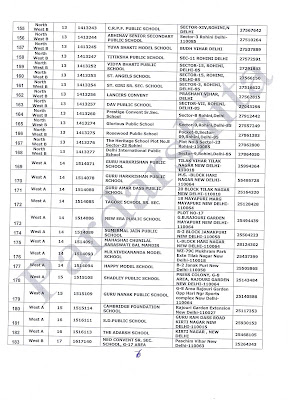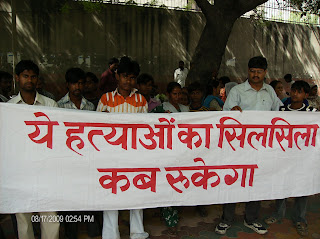Date: 27th and 28th Nov, 08
Place: ISI, Lodhi Road, New Delhi
Objective: To build the capacity of the community Women groups and nurture multiple leadership among them so as to enable them to provide leadership and guidance to the larger community in accessing their basic rights.
Background: Community level meetings with the women groups are regularly being organized in the office of Bawana & Seema Puri. During the meetings the groups are being sensitized on their entitlement issues and build their capacity, with the result of these meetings Ration Samiti, Monitoring Group on EWS issue, group on public work department are also formed in Seema Puri.
Process: Keeping these points in view the existing women groups needs to be strengthen with enhanced capacity building initiatives to inform them about their rights and the means to assert them.
The major focus was on intensification of the informal collectives so that they can tackle local level issues themselves without any external technical facilitation.
There were three capacity building trainings; two in Bawana and one in Seema Puri were proposed. Therefore two combined capacity building trainings were arranged on large scale, in which fifteen women from Bawana and 10 women from Seema Puri were invited for training on each day. The trainings were organized on the issue of PDS, Education, health and responsibility.
The resource persons on Day 1, 08 were Mrs Amita Joshi & Mrs. Kalyani.
Focus area of discussion: Responsibility, Need of Community, How to ensure the responsibility of State, SWOT Analysis and Mapping
Morning session by Mrs. Amita Joshi
The training was started with the self introduction of participants followed by the discussion about what they need to lead a good life.
The women replied Employment, education, sanitation, good environment.
They were told that above all we need to have good health because until unless we are healthy we would not be able to do anything in our life.
We can borrow every thing from others, but health could not be borrowed, therefore foremost thing we need to concentrate is SELF-RESPONSIBILITY.
For this we need to take care of surrounding healthy atmosphere, nutritious food, initial care if any problem arises, timely vaccination and self hygiene.
The importance of good eating habits was also told to them. If there is any problem like itching, or any rash on the body it should not be taken lightly, proper care should be required.
Importance of Community: What is community? Why there is a need to live together? Is a crowd of people is community?
The importance of community was discussed. Broadly community means: common interest, unity, responsibility, resolution of problem peacefully.
So we have to take up our issues collectively so that we could achieve the results of our efforts and if we work or think on a common platform, in that case we could have more solutions. Therefore there is importance of community.
Example; there is an group in Mumbai Sewa which is actively working in the community and if there is any case of women violence or any kind of dispute in the family then this group helps in resolving the issue.
Ensuring state responsibility: It is the responsibility of state to give proper food, clothing, shelter and occupational chances to the citizens, and to avail such facilities we need to have information about such responsibilities of state.
A woman from Bawana shared that the ration shopkeeper is charging much for the ration which he distributes. At once another woman from Bawana extended her support and asked her which ration shopkeeper dose this. She stated so because they have got the information about the cost at which the ration is allocated and they have formed a group to assist the people who so ever are facing problem in the community.
This was a nice learning about the importance of self responsibility and how we can fix the responsibility of state. The importance of information and need of community was also very well explained.
After noon session by Mrs. Kalyani:
This session was started by a song
“MERE SAMUH KI PANCH LADIYA SANGATHAN BANAUNGI JAROR CHAHE LAG JAYE HATHKADIYAN”
Firstly they were asked do they know each other because a round of introduction was over in the morning session the group was quite which shows that they have not participated during the introduction round, then they were asked to sit alternately i.e. one woman from Bawana & other from Seema Puri and an exciting round of introduction was initiated by Mrs. Kalyani. This kind of introduction subside the hesitation and it gives a chance of better understanding and feeling of confidence too.
After this they were again divided in to two groups Seema Puri & Bawana and were asked to recall on which issues they have worked so far.
SWOT Analysis was done with the women group of two areas.
The Seema Puri group stated that they are working on 14 issues in their areas and Bawana group stated that they are working on 12 issues in Bawana.
The threats which they face while doing these social works were also discussed.
Power and weakness of group formation was also discussed.
The threats which they face are family, why to attend meetings, greed what we could get, attending the meetings is not considered respectable.
But the women were encouraged that because of attending meetings you get information and the information which they gain gives them strength and guidance for further efforts.
They were also told the importance of mapping of the organisation which are working in their area. Mapping helps in resolving the other issues beside the right based issues like: domestic violence, informal education, crèches etc.
The session was ended with an assignment that was given to the women to form a mapping chart based on the organisations which are working in their communities, which could help in alliance building too.
In the end a song was sung by Mrs. Kalyani:
“PAR LAGA LIYE HAI HUMNE KI PINJRE MAY KAUN BETHEGA, JAB TOD DIYE HAI JANJIRE TO KAMYAB HO JAYEGE JARA SUN LO.”
The whole discussion of first day encouraged moral of the women group, they were told how to overcome their hesitation whenever they interact with each other. They were also told about the importance of responsibility and organizing themselves in community.
WOMEN CAPACITY BUILDING TRAINING BAWANA & SEEMA PURI
Day 2, the resource persons were Mrs. Ritu Mehra from Pardarshita & Advocate Sh. Ashok Aggarwal from Social Jurist.
Morning Session: Ritu Mehra
The women from Bawana & Seema Puri were asked to sit in a manner so that they could interact with each other and could introduce her partner rather then introducing her. This method was adopted just to overcome their hesitation and they could know each other.
After the introduction there was an open discussion about the problems in PDS which the people are facing specifically in Bawana. The problems which came to notice are:
• Ration shopkeeper give less quantity of ration.
• Ration shopkeeper misbehave with the people.
• Kerosene oil on their ration card is replaced by cooking gas during renewal process.
• Ration shopkeeper distribute ration once a month only.
It was quite interesting that the women group from Seema Puri told the women group of Bawana that they have to unite together and need to talk to the ration shopkeeper.
In Seema Puri women group have formed Mahila Ration Samiti which is actively working on the problems which ever they face with the ration shopkeepers. They also shared that how they formed the group and how actively they are fighting with ration shopkeepers. This Mahila Samiti is continuously asking for the records of ration dealers on monthly basis, with the result of this now ration shop keepers are giving proper quantity and ration is being distributed timely.
Shehnaj from Seema Puri also shared that the ration shopkeeper had not distributed ration to the Antodaya Ration Card holders for last 2 months and when those women filed complaint against the ration dealer in the food & supply office, the vary next day the ration dealer went to their home and gave ration of two months which he had siphoned off.
After listening to the problems of the group the suggestions which were suggested to them were:
Strength of group
Checking of ration dealer records on every Saturday except second Saturday from 2.00pm to 5.00pm.
Filing of complaints in Food & Supply Department.
Use of Right to Information.
The process of filing complaint in the office of FSO was also explained that they have to file their complaints in the register and have to take the copy of complaint too.
The process of filing RTI application to know the status of their complaint was also explained.
The capacity Building training was well taken over by the women group of Seema Puri when they shared their success with the women group of Bawana. This all sharing increased moral of the Bawana group also and they decided that they would also form a group and would also fight for their rights.
After Noon Session by Advocate Sh. Ashok Aggarwal
The focused areas of discussion were Right to Education, Health and Laborers.
He stated that although Right to Education is a Fundamental right but at the ground level the scenario is very bad, the underprivileged groups are always discouraged. We need to fight for our Fundamental Rights.
Major threats are; lack of unity, lack of confidence and people deceive each other for the sake of small benefits. Just to avail our rights education is the only media through which we can win our fight.
Education brings changes, it gives freedom of speech. Poverty is not the reason for depriving the child from education, but lack of awareness is the basic root cause for illiteracy.
Our Government is responsible for quality education and for everything be it the infrastructure in schools, drinking water facility, toilets, good teachers; but children face many difficulties in this.
Therefore there is a need of raising demand from the govt. to provide all the facilities in the schools and provide good atmosphere so that the future of the nation which is nourishing in the school could flourish.
He also told about the admissions under economically weaker section quota in Public schools.
It was also discussed that the child labor should also be prohibited and Govt. must take prompt action against the child labor.
Health: Poverty, improper nutrition, child labor leads to bad health. Our Govt. is also responsible for providing good health to the citizens. The health facilities in Govt. hospitals are provided free, but the patients are forced to pay for various tests and medicines.
It was also told that there are 38 Private hospitals which provide free treatment to those patients whose monthly income is less than Rs.4000. He gave the list of 38 hospitals. There are around 1000 beds available for the economically weaker section of the society who could avail free treatment in these hospitals.
Labor and their rights: The minimum wage for the unskilled labor is minimum Rs.3700-3800 a month, but people are not being properly paid for their hard work, they are being exploited by their owners. Therefore Sh. Aggarwal also invited such people who are being exploited by their owners.
It was a great informative session beside lots of information Sh. Aggarwal ji extended his legal support to the deprived labor class who are continuously being exploited by the employers.
Both the women groups learnt a lot from these training and committed that they will form group in their own area and would take lead in resolving their problems which they are face in the government machinery. They will use RTI Act too to get the information.



































